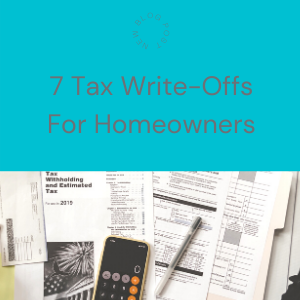
7 Tax Write-Offs For Homeowners
As a homeowner, you can benefit from tax breaks that shave thousands of dollars off your IRS bill each year, which could mean a higher refund check. It’s that time of year, and we are all gathering our documents and working on getting our taxes done; I just wanted to remind you about what owning a home can do to help your tax situation.
Read over the list below to see what could pertain to your situation. You could take other deductions that I haven’t listed here, so be sure to always consult with your tax advisor. These are just reminders of what to talk to them about; this is not tax advice.
- Mortgage interest. If you purchased your home before Dec. 16, 2017, you can deduct the mortgage interest paid on your first $1 million in mortgage debt. For mortgages taken out since that date, you can deduct the interest on the first $750,000. You’ll want to talk with your accountant about whether it’s better to deduct the mortgage interest or to take the standard deduction instead. The standard deduction is currently $12,400 for single filers and $24,800 for married taxpayers filing jointly. If you decide to deduct the mortgage interest, you’ll need to itemize your income taxes to claim this. Don’t just fill out the 1040-EZ without doing the math first to see whether itemizing or the standard deduction will result in the lowest tax bill – or highest refund – for you.
- Property taxes. Property taxes on all real estate are fully deductible. When you buy a house, check the settlement sheet to see if you reimbursed the seller for property taxes they prepaid for a period you owned the house. If so, include that amount in your property tax deduction.
- Credit for green improvements. This is not a tax break but a credit. It allows homeowners to take up to $500 off their federal income tax for making certain improvements that increase the energy efficiency of their homes, such as water heaters, furnaces, boiler, heat pump, windows, or roofing.
- Investment Property/Rental Property. The cost of maintaining and marketing a rental property can be deducted from the income the property generates, without regard to the owner’s tax status. These expenses include mortgage interest payments, insurance, utilities, maintenance, repairs, advertising costs, and management fees, as well as the non-cash cost of depreciation.
- Home office. You can deduct the costs of a home office that you use exclusively as your principal place of business. This one is notorious for causing audits, so if you claim this one, be sure to talk with your accountant about your situation and whether you qualify.
- Tax-free rental income. If you rent out your own home for 14 days or less during the year, the rental income is tax-free.
- Capital Gains: Remember, if you sold your principal residence, you might not have to pay tax on the gain. The IRS typically allows you to exclude up to $250,000 of capital gains on real estate if you’re single and $500,000 of capital gains if you’re married and filing jointly. If you are selling an investment property, that’s where it gets a little more complicated, but you could do a 1031 exchange to avoid paying capital gains on that sale as well. If learning more about that interests you, reach out to me, and we can talk more. I can also recommend a 1031 expert who can answer all your questions about this program.
So, there you have it—the basics of tax benefits for homeowners. There are others, so be sure to talk to your accountant or tax advisor. At the very least, take advantage of these.
The only question now is, what are you going to do with that big refund check? I’d love to know!
Hi, there!
Let's Chat
email ME
bethany@marysvilleliving.com